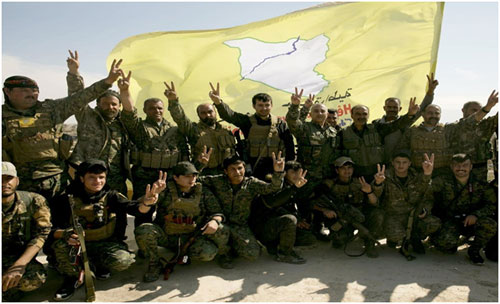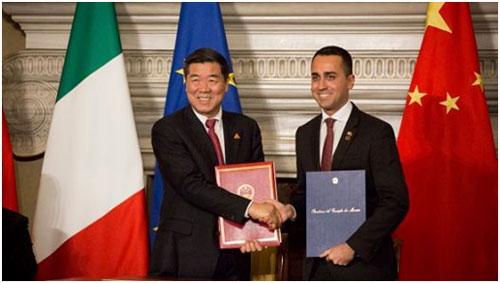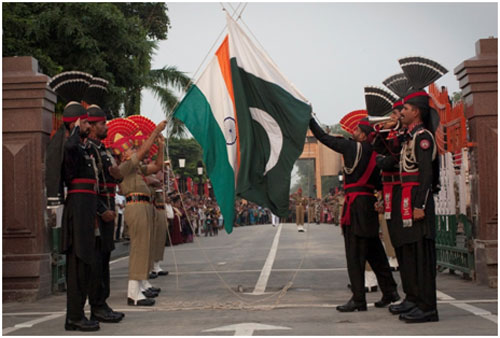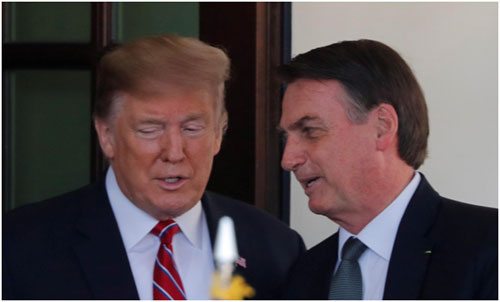
On Saturday, 23rd March 2019 the US-backed Syrian force known as the Syrian Democratic Forces (SDF) declared their victory over the last remnants of the Islamic State's (IS) militants in Syria. The battle against the self-proclaimed caliphate had been continuing for five years since 2014 with the group controlling large parts of Iraq and Syria.
The militants were cornered into Baghouz, a border village in Eastern Syria where after weeks of gruelling siege the SDF emerged victorious raising their yellow flag on the shell-pocked house where the militants once flew their black flag. Mustafa Bali, a spokesperson for the SDF tweeted "Baghouz is free and the military victory over the Daesh has been achieved," using the Arabic acronym for the group. However, the group continues to have a scattered presence along with sleeper cells across Iraq and Syria.
IS, at its peak, controlled a third of both Iraq and Syria. It carried out massacres in the region killing millions. Numerous murders and beheadings of foreigners and journalists were documented and circulated online through social media. Along with this, IS had also claimed responsibility for terror attacks including the Paris attack of 2015 which had caused 150 causalities. France has been a member of the forces fighting IS since 2014 and the French President Emmanuel Macron tweeted that "a major danger to our country has been eliminated, yet the threat remains and the fight against terrorist groups must continue." Mustafa Bali also pledged to continue the fight against the remnants of the terror group till they are eliminated.

One more feather added to the Chinese controversial Belt and Road Initiative. Out of all the G-7 and the EU countries, Italy becomes the first to join hands with China in her global infrastructure-building project i.e. BRI. Italy on 23rd March 2019 signed 29 memorandums of understanding (MoU) with China, giving a jolt to her Euro-Atlantic allies. Though, the agreements signed between them are alluded as non-binding. To this end, series of doubts and serious concerns surrounds the EU members to Italy's transatlantic ally US. Bold statements both within and outside the EU made the headlines in top media.
Taking the concern in the account, it also becomes important to mention the push factor that led Italy to join the Dragon's hand. The third phase of the economic recession and the internal political turmoil are major causes that led Italy's entry into such pact. The strong sense of betterment within the EU and massive rise of populist sentiments within Italy, giving voice to the far-right leaders, proved quite opportune for China to lay her The New Silk Road and "debt-trap diplomacy" stimulus in Italy. Italy by becoming a signatory to the agreement, gestured welcoming the Chinese investments in the form of inexpensive loans and low-interest credits to her territory.
However, the remarks by Prime Minister Giuseppe and Italy's Minister of Economic Development, Luigi di Maio stated Rome's goal of "maintaining the equilibrium" signaling equal outflow and inflow of "Made in Italy" and "Made in China" respectively.
To the eyebrows raised in Washington DC and Brussels, PM Conte seemed to pacify their concerns. PM Conte told that the commercial and economic deals with China are in no way undermining the Euro-Atlantic ties that Italy holds from time immemorial. So far, the statements need more analysis and requires a wait and watch situation from Italy's allies in the West.

The Indo-Pak equation has been worsening ever since the Pulwama-Balakot military tensions. It hit a new low recently, when the Indian Authorities declared its decision to not join the celebration of Pakistan National Day. The major reason behind this was the invitation of Hurriyat leaders, Indian High Commission boycotted the diplomatic norm of sending representatives to the host country. India criticised Pakistan for its engagement with Kashmiri separatist leaders as it fuels the already hostile situation in the region.
Despite this diplomatic move, Twitter saw the exchange of greetings between the Indian and Pakistani Prime Ministers. PM Modi mentioned about working towards a peaceful resolution while his Pakistani counterpart, Imran Khan reciprocated by welcoming the Indian wishes. The question that arises here is whether one can perceive this as a break from the ongoing territorial dispute in the neighbourhood. The Indian boycott and the continued military demonstrations by Pakistan are factors to be looked at while analysing this new change.
China encouraged the goodwill messages shared between Pakistan and India. It is believed that this will play a 'constructive' role in shaping a dialogue between the two nations. China has tried to maintain neutrality by calling for restraint between the two countries. China had also sent the Chinese vice foreign minister to talk to Pakistani leaders. However, China has been the only permanent member in the UNSC to veto the listing of Masood Azhar.
The Indo-Pak dynamic has always been fluctuating but the latest diplomatic change has popped up many doubts and questions regarding the improvement in their relations. However, taking anything at face value in this scenario requires a lot of thinking.

Donald Trump recently hosted the newly elected President of Brazil, Jair Bolsonaro. During his stay at the White House, Trump found a new 'friend', someone with whom he could relate. Trump knowingly said that Brazil is a very important non-NATO ally of the US, and could very well be a part of the NATO. Brazil, the 8th largest economy, is not part of the NATO alliance. Founded in 1949, the NATO alliance is a European-North American alliance.
Trump on different occasions has condemned the NATO calling it as bad as NAFTA, which according to Trump is a lost-case for the USA. According to Artcle 10 of the NATO laws, only European countries apart from Canada and the US can be a part of the alliance. There have been suggestions to modify the treaty and open up the alliance for other countries apart from European countries to join like New Zealand, Australia, and Japan, due to the trouble in the meeting of military and defense commitment to the alliance.
Trump has been inconsistent with regard to the commitments of the US to the NATO, leaving many European member states in serious worries. But it is not an easy job to add members to NATO as it requires the approval of all the member states. Considering the right-wing nature of Bolsanaro, Germany, and France would be in clear objection to welcome Brazil into the alliance.
Image Source: MPR News, CNBC news, CNN, REUTERS/Carlos Barria